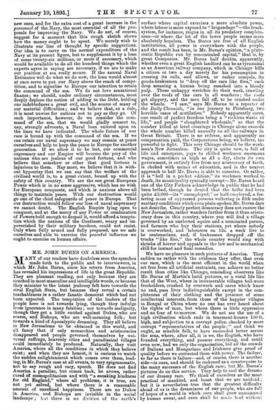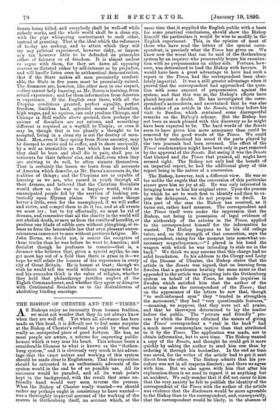MR. JOHN BURNS ON AMERICA.
MANY of our readers have doubtless seen the speeches made both to the public and to interviewers, in which Mr. John Burns, since his return from America, has revealed his impressions of life in the great Republic. They are pleasant reading, not only because they are couched in most masculine and intelligible words, or because they minister to the latent jealousy felt here towards the rival English State, but because they reveal a certain teachableness in a rather fanatic democrat which had not been expected. The temptation of the leaders of the people here is not towards lying, though they indulge from ignorance in many falsities ; nor towards malignity, though they get a little excited against Dukes, who are scarce, and Bishops, who are' well-meaning folk ; but towards a kind of Apocalyptic dreaming. They all believe in New Jerusalems to be obtained in this world, and all fancy that if only monarchies and aristocracies disappeared. and people governed themselves by uni- versal suffrage, heavenly cities and paradisaical villages could immediately be produced. Naturally, they visit America, where all the conditions in which they believe exist; and when they are honest, it is curious to watch the sudden enlightenment which comes over them, lead- ing, in Mr. Burns's case at all events, to very epigrammatic, not to say rough and racy, speech. He does not find America a paradise, but comes back, he avows, rather cured of cosmopolitanism and with "a sneaking kindness for old England," where all problems, it is true, are not yet solved, but where there is a reasonable amount of unrefined happiness. There are no Dukes in America, and Bishops are invisible in the social landscape ; bat there is no division of the earth's surface where capital exercises a more absolute power, where labour is more exposed to "brigandage "—the truck. system, for instance, reigns in all its predatory complete- ness—or where the lot of the lower people seems more absolutely hopeless. The States are free of all English institutions, all power is everywhere with the people, and the result has been, in Mr. Burns's opinion, "a pluto- cratic Republic run by concentrated capital," that is, by great Companies. Mr. Burns half doubts, apparently, whether even a great English landlord can be as tyrannical as an American railway company, which in Chicago kills a citizen or two a day merely for his presumption in crossing its rails, and allows, or rather compels, its goods-brakesmen to "drop off the cars like flies," each drop meaning a human being smashed into a bloody pulp. These unhappy wretches do their work, crawling over the roofs of the cars in all weathers ; the roofs get slippery, and the men fall off, to be crushed under the wheels. "I saw," says Mr. Burns to a reporter of the Daily Chronicle, "in one journey to Pittsburg, two horrible cases of mutilation." Nobody apparently cares, one result of perfect freedom being a "reckless waste of life," and people "slaughtered wholesale," so that the number killed at level crossings in Chicago alone exceeds the whole number killed annually on all the railways in Great Britain. There is no redress, and apparently no compensation paid, the Corporations being, we believe, too powerful to fight. This very Chicago should be the work- men's New Jerusalem. The city is quite new, is full of life and enterprise, pays to skilled workmen enormous wages, sometimes as high as .t1 a day, elects its own government, is entirely free from any aristocracy of birth, is choked with means of education, and is the nearest approach to hell Mr. Burns is able to conceive. Or rather, it is "hell in a pocket edition," its workmen worked to death, its municipality cynically corrupt—Mr. Burns heard one of the City Fathers acknowledge in public that he had been bribed, though he denied that the bribe had been quite .0,000—its "unemployed," or half-employed, a fes- tering mass of oppressed persons weltering in filth under sanitary conditions which even plain-spoken Mr. Burns dare not describe. Clearly perfect democracy does not ensure the New Jerusalem, rather wanders further from it than aristo- cracy does in this country, where you will find a village governed by an unelected squire and a nominated parson, and farmers who buy their stations, yet where nobody is overworked, and labourers on 12s. a week live to be centenarians, and, if brakesmen dropped off the trucks "like flies," the whole country would ring with shrieks of horror and appeals to the law and to mechanical skill for instant and final remedies.
We have no pleasure in such pictures of America. They sadden us rather with the evidence they offer, that even our race, which is the most efficient in the world. when set free from all artificial restraints, can achieve no better result than cities like Chicago, reminding observers like Mr. Burns of Martin's lurid pictures, or a rural life like that of the West, where in innumerable villages toil-worn freeholders, crushed by overwork and cares which know no end, pass lives indistinguishable except in the com- pleteness of their clothing and the presence of some intellectual interests, from those of the happier villages in Bengal or China where no one has ever heard about the rights of man, but where there is little oppression and no fear of to-morrow. We do not see the use of a high civilisation which ends in tenement-houses 150 ft. high, and subjection to a corrupt police, checked by more corrupt "representatives of the people ; " and think we ought, as sensible folk, to have succeeded better across the seas, where, after all, it is we, the English, who have founded. everything, and possess everything, and could even now, had we only the organisation, bid all the crowds of Italians and Hungarians and Irishmen give proof of quality before we entrusted them with power. The failure, so far as there is failure—and, of course, there is another side—is ours, and should be reckoned as a counterpoise to the many successes of the English race ; but Mr. Burns's pictures do us this service. They help to cool the dreams of our dreamy race. We think of ourselves as the most practical of mankind, and boast that we are unidead ; but it is nevertheless true that the greatest difficulty ahead of us is the dreaminess of our people, who are full of hopes of a world in which corn shall grow unmanured by human sweat, and oxen shall be made beef without beasts being killed, and everybody shall be well-off while nobody works, and the whole world shall be a clean sty, with the pigs whispering contentment to each other, instead of grunting. That is the ideal which the reformers of to-day are seeking, and to attain which they will try any political experiment, however risky, or impose at y tax however little to be defended on principles either of fairness or of freedom. It is almost useless to argue with them, for they set down all opposing reasons as dictated either by self-interest or by prejudice, and will hardly listen even to arithmetical demonstration, that if the State makes all men pecuniarily comfort- able, the State in five years must be pecuniarily ruined. The dreamers are, however, like other men in one respect, —they cannot help learning, as Mr. Burns is learning, from actual experience ; and for them information from America is experience. If the English over there, with all the Utopian conditions granted, perfect equality, perfect freedom, limitless land, splendid means of education, high wages, and no squires, can only produce Chicago, and Chicago is Hell visible above ground, then perhaps the axioms of Socialists are not axioms, and something different is required as a waybill to Utopia ; or even it may be, though that is too ghastly a thought to be accepted, living in a clean sty is not the destiny of man- kind. Men, even if they spring from Norse ancestry, may be doomed to strive and to suffer, and to share unequally, by a will as irresistible as that which has decreed that they shall be born and shall die in pain, shall pay in torments for their fathers' sins, and shall, even when they are striving to do well, be often sinners themselves. That is certainly the lesson we learn from all accounts of America which describe, as Mr. Burns's accounts do, the realities of things ; and the Utopians are as capable of learning as we are, who passed in youth through all their dreams, and believed that the Christian Socialists would show us the way to a happier world, with an emancipated people fed by the exertion of looking con- tentedly upon Elysian plains. We may make things better a little, even for the unemployed, if we will suffer and strive, and compel them to do it too, and at all events we must try ; but to try effectually, we must be rid of dreams, and remember that all the charity in the world will not abolish death, or save us from the results of heredity, or produce one blade of edible corn without ploughing, or re- lease us from the lamentable law that even pleasant uncon- sciousness comes not to man without previous fatigue. Mr. John Burns, we doubt not, is nearer the reception of those truths than he was before he went to America ; and Socialist though he professes to remain—that is, a dreamer who believes that, given a special scythe, he can get more hay out of a field than there is grass in it—we hope be will relate the lessons of his experience in every city of Great Britain. He is honest at least ; though we wish he would tell the world without vagueness what he and his comrades think is the value of religion, whether they hold that philanthropy justifies neglect of the Eighth Commandment, and whether they agree or disagree with Continental Socialists as to the desirableness of abolishing binding marriage.



































 Previous page
Previous page